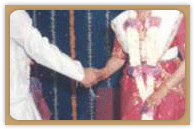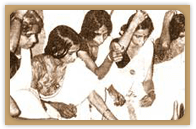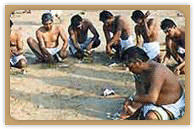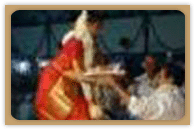|
 |
|
 |
| |
 |
Pallikettu
The
bundle of offerings to Lord Ayyappa carried by pilgrims
who go for Sabarimala pilgrimage is known as Pallikettu.
It is also known as Irumudikettu.
|
Palukudy / Noolukettu
Palukudy
or noolukettu is a function organised on the 28th
day after birth of a child. Palukudy, noolukettu and
choroonu are important for the newborn babies.
Though the second and third (Noolukettu and Choroonu)
functions are being followed today, the first (Palukudy)
is not common. On 28th day of birth, the child will
be bathed and placed on the lap of Grandfather/Karanavar.
Five small bells and a small pipe made of Panchaloha
(five metals – gold, silver, copper, iron and lead) will be
attached in a chord (gold string is also used) and tied around
the waist of the child. This function is known as Noolukettu.
It is believed that on the 28th day the child is
taken to the possession of the Tharavad from the father.
After Noolukettu the Karanavar or mother will
give milk to the child three times using a spoon or spoon like
thing made of jack tree leaf. Then the Karanavar spell
the name of the child silently for three times. The name
will not be disclosed till the end of Choroonu function.
Panigrahanam
 |
Panigrahanam
is an important function of a marriage. The bride
and bridegroom will join their right hands and walk around
the temple or marriage mandapam (place where marriage
takes place). |
Pantheerady
The main pooja (worship) performed in
temples between the Ushapooja (morning pooja)
and Uchapooja (noon pooja).
Para
An offering known by names Parayeduppu,
Paranirappu, Parayezhunnallikkal. Nirapara and Nilavilakku
are used for many functions. Paddy will be filled in Para
(a cylindrical measuring vessel which can measure about 10 Kg.)
and Idangazhy (another measuring jar of about 1 Kg.).
There is another type of para also. This is found
in Malabar area. For conducting this, one bunch of coconut flower,
4 men to beat drums, Ilathalam, Chengala (musical
instruments) and 2 for Kuzhal (another musical instrument)
and one Velichappad (oracle) are required. Two women
will carry paddy. The team will proceed from temple to
each and every home to accept offerings.
Parappedi and Pulappedi
Parappedi and
Pulappedi were malevolent customs prevailing in ancient
Kerala. In South Kerala it is known as Parappedi and
in north Kerala as Pulappedi. In certain days when
low caste people belonging to Pulaya or Paraya community happens
to seethe women of higher caste or throw stones at them, that
lady will be abandoned socially.
Pathamudayam (Tenth holy day)
The 10th day of the month Thulam
(October-November) and Medam (April-May) are known as
Pathamudayam. Pathamudayam of Tulam
(October-November)
is known as Thulapath and that of Medam (April-May)
is known
as Medapath. Both are important for agricultural operations.
The importance of Vishu festival will last till the Pathamudayam.
Pathinaru (Sixteenth day)
Pathinaru is one of the funeral rituals.
It is conducted on the sixteenth day after death.
Pathirapoochoodal
 |
Pathirapoochoodal
is an important function connected with Thiruvathira.
At Thiruvathira midnight, after taking
bath, women used to wear dashapushpam (a
flower). Consequent on the decline of matrilineal
system, Thiruvathira festival as well as
the function of Pathirapoochoodal is also
vanishing. |
|
Pennukanal
The practice of bridegroom seeing
the bride before marriage is fixed is known as Pennukanal.
The bridegroom, his relatives including his uncle father, mother
and friends will come to the bride’s residence and see her.
Porutham (matching)
To compare the likeness of the horoscopes of bride and bridegroom
before marriage is called porutham nokkuka. Though
there are 23 such likings (porutham) factors, only 10
are considered as important. They are (1) Mahandra
Porutham, (2) Yoni Porutham, (3) Dina Poruham,
(4) Rashi Porutham, (5) Rasyadhi Porutham, (6)
Vashya Porutham, (7) Gana Porutham, (8) Sthree
Deergha Porutham, (9) Rajju and (10) Vedam.
Besides the above, Ayavyaya Porutham, Mana Porutham, Nasika
Porutham, Ayuporutham are also there. In addition
to this, Papa Samyam is also looked into.
Pirannal
(birthday)
The
birthday celebration conducted once in a year when the birth
star (asterism day) comes. The first birthday will be on the
28th day after birth. Following this, every
year birthday is celebrated. It is known as Andupirannal.
Pithrupooja
 |
Pithrupooja
is the ancestral worship. It is also known
as Sradham or Pindom or Pithrubali. Pithrupooja
at Thirunelli, Thiruvallom and Rameswaram are
famous. Special Pithrupooja is conducted at Thirunavaya,
Varkala and Aluva on the day of Karkidakavavu
and the vavu (no moon day) in Kumbhom (February-March)
coming after Sivarathri. |
|
Pradikshinam
Pradikshinam is the practice of going around
the temple in a circle. The mode of Pradikshinam to each
god and goddess is different.
Pradosham
Pradosham is a vrutha (penance) for
appeasement of Lord Siva. It is believed that on Pradosha day
Lord Siva dances as Nataraja. In the morning after taking
bath, one has to go to Siva Temple for worship. In the day time
upavasa is to be performed. In the dusk again they
have to take bath and go to temple. In night after reading holy
books the vrutha will come to an end. The
Sani Pradosham (when Saturday and Pradosham come
on the same day) is considered as most important. On that
day offering prayer to Lord Siva with petal of Koovalam
flower will bring contentment to the devotee.
Prasadam
Prasadam is the sandalwood paste, bhasmam (sacred
ash) and kumkum (Vermillion) given in temples. To wear
it in forehead and chest is considered as a blessing.
Pudamuri (wedding)

Receiving
‘pudava’ which is a part of modern marriage |
Pudamuri is the marriage of nairs. It is
also known by names Pudavakoda, Pudamurikallyanam
and sambandham. In olden days, Kettukalyanam
was celebrated in a grand scale. However,
the real marriage, pudamuri was celebrated
in a less expensive manner. A woman becomes
a wife of a man when he gives a cloth (pudava)
to her in front of a Nilavilakku (holy
bell metal lamp with wicks) and in the presence
of few witnesses. |
|
Pula and Pulakuli
Pula
(pollution) is compulsory to all. This is observed during
birth as well as death. A few days coming after death of a close
relative are considered as Pula. If one touches a person
who has pula, he should immediately take a bath. During
olden days all Hindus observe Pula for 10 days. Now different
castes have different types of pula like Pathupula,
Panthrandupula, Pathinarupula. The Nairs of North Malabar
had a 12 days Pula. In south Malabar they
observed it for 15 days. The bath taken to remove pula
is known as Pulakuli rite. The priest who authorised
to do the funeral rites spray holy water on the heads of people
who are having pula and they should take bath and wash
their cloths.
Pulappedi-Parappedi-Mannappedi
(Fear of touch by lower caste)
Pulappedi-Parappedi
was a malevolent custom feared by all women of the upper castes
especially Nairs. This custom created a fearful atmosphere
in the Nair families of 19th century. Dreaded
incidents were witnessed in the northern parts of Kerala and
in Onattukara-Kuttanad areas during the months of February-March.
The Naduvazhis (local rulers) permitted people belonging
to the lower caste to enter the Kavus (worshipping centres
/ temples) and offer prayers during the festival days once in
a year. They were permitted to take bath in the ponds
intended for upper castes. They had the right to touch
the women whom they meet on their way. The ladies who
were thus touched by the lower castes have to go with them.
They can never return to their own houses according to the rule
of the community. This immoral practice was known as
Pulappedi-Parappedi
Pulikudy
Pulikudy or Pumsavanam is a pre-delivery ritual
observed in the seventh month of pregnancy, which is considered
as an important function during pre-delivery period. Among
the Namboodiries, the husband gives a mixture of gram and curd
to the pregnant wife for consumption. Among others, rice is
cooked in the juice of tamarind leaves and given to the pregnant
woman.
Puthenthiruvathira
The first Thiruvathira coming after marriage
is known as Puthenthiruvathira or Poothiruvathira. This
is celebrated in the bride’s residence.
|
|
 |
|
 |
|







